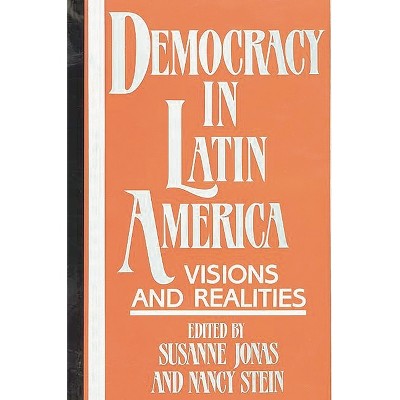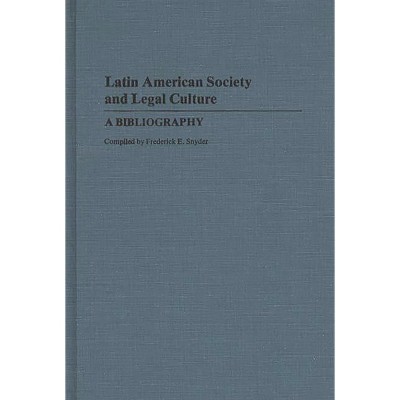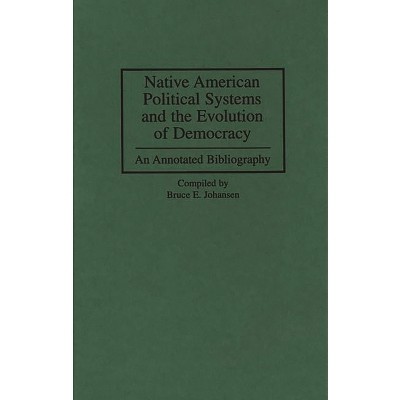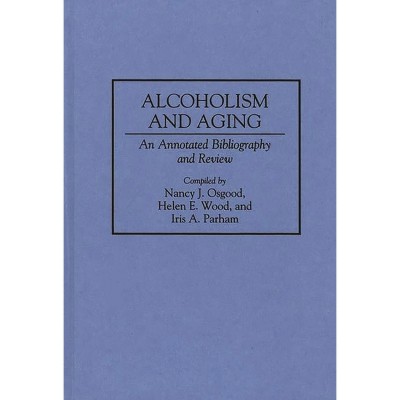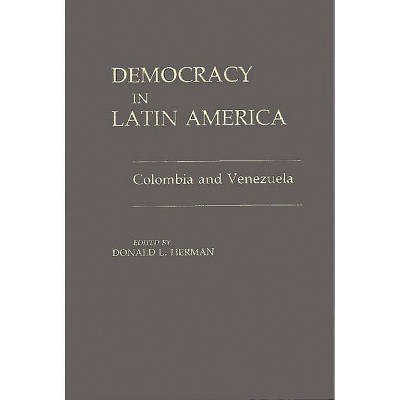Sponsored

Democracy in Latin America - (Bibliographies and Indexes in) by Susanne Jonas & Nancy Stein (Hardcover)
In Stock
Sponsored
About this item
Highlights
- Recent events throughout Latin America have placed issues of democracy on centerstage.
- About the Author: SUSANNE JONAS teaches Latin American studies at the University of California at Santa Cruz.
- 232 Pages
- Political Science, International Relations
- Series Name: Bibliographies and Indexes in
Description
About the Book
Recent events throughout Latin America have placed issues of democracy on centerstage. Collected here for the first time are articles that evaluate different models of democracy, challenging the realities and myths of the practice of democracy in various countries throughout the region. This is a provocative and revealing study of the critical issues in the struggle for democracy and current events in the Third World and the United States.
Through the writings of leading Latin American and U.S. scholars, including James Petras, Pablo Gonzalez Casanova, and Max Azicri, the book addresses such important topics as whether Washington's model democracies are truly democratic, and how Guatemala's civilian regime compares to Nicaragua's revolutionary democracy. By covering countries as diverse as Cuba, Argentina, and Guatemala, the collection adds to an understanding of different models of democracy and challenges traditional methodologies used to evaluate them. Several essays put the issue of democratization in the context of economic crisis, resulting in political redefinitions, and the emergence of the new social movements. The book includes a foreword and introduction by the editors, and concludes with a comprehensive index. It will be a useful resource for courses in political science and Latin American history, and an important addition to college, university, and public libraries.
Book Synopsis
Recent events throughout Latin America have placed issues of democracy on centerstage. Collected here for the first time are articles that evaluate different models of democracy, challenging the realities and myths of the practice of democracy in various countries throughout the region. This is a provocative and revealing study of the critical issues in the struggle for democracy and current events in the Third World and the United States.
Through the writings of leading Latin American and U.S. scholars, including James Petras, Pablo Gonzalez Casanova, and Max Azicri, the book addresses such important topics as whether Washington's model democracies are truly democratic, and how Guatemala's civilian regime compares to Nicaragua's revolutionary democracy. By covering countries as diverse as Cuba, Argentina, and Guatemala, the collection adds to an understanding of different models of democracy and challenges traditional methodologies used to evaluate them. Several essays put the issue of democratization in the context of economic crisis, resulting in political redefinitions, and the emergence of the new social movements. The book includes a foreword and introduction by the editors, and concludes with a comprehensive index. It will be a useful resource for courses in political science and Latin American history, and an important addition to college, university, and public libraries.Review Quotes
"This small edited collection of ten articles deals in various ways with the democratization of Latin America. In view of recent events throughout the world the topic is certainly a worthy one. . . . [T]he interview with Fidel Castro by the veteran Mexican newsman Regino Diaz is excellent; it goes a long way toward explaining the Latin American view of the debt crisis. The two chapters by editors Jonas and Stein on Nicaragua and Guatemala are outstanding. One is left with the feeling that more from these authors would have strengthened the entire book. Useful for students in Latin American politics and economics."-Choice
?This small edited collection of ten articles deals in various ways with the democratization of Latin America. In view of recent events throughout the world the topic is certainly a worthy one. . . . [T]he interview with Fidel Castro by the veteran Mexican newsman Regino Diaz is excellent; it goes a long way toward explaining the Latin American view of the debt crisis. The two chapters by editors Jonas and Stein on Nicaragua and Guatemala are outstanding. One is left with the feeling that more from these authors would have strengthened the entire book. Useful for students in Latin American politics and economics.?-Choice
About the Author
SUSANNE JONAS teaches Latin American studies at the University of California at Santa Cruz. She has written extensively on Central America and is currently working on a book on Guatemala, as well as analytical articles concerning recent developments in Central America based on firsthand observation.
NANCY STEIN has researched and written extensively on U.S. policy toward Latin America with a focus on Central America and U.S. military policy. She is a former president and current board member of Global Options, a San Francisco-based research organization.Shipping details
Return details
Trending Non-Fiction






